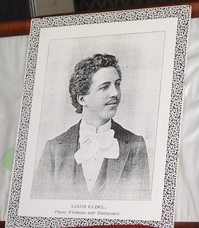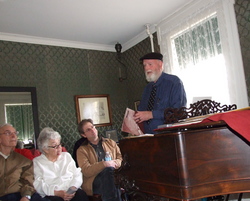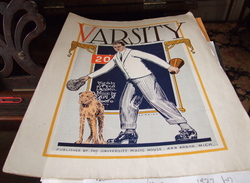Talk of the Town: Hail to the Victors - a borrowed song?

It's long been said that there's nothing new under the sun. That's certainly the case where music is concerned, according to music historian Michael Montgomery, who gave a lecture on the provenance of several classic University of Michigan songs today at the Kempf House Museum on S. Division.
In the last quarter-century, the authorship of the University of Michigan fight song, "The Victors," has come into question. Some critics believe Louis Elbel, author of the iconic song, borrowed a crucial trio from George Rosenberg's April 1898 "The Spirit of Liberty March" in composing the song. Michigan loyalists believe Elbel's work should be recognized as unique, distinct from "Spirit of Liberty."
But as Montgomery explained, this type of borrowing is commonplace in music. By the same standard critics use to argue Elbel stole "The Victors" from Rosenberg, Montgomery said, it could be argued the Star-Spangled Banner, America's national anthem, was also stolen.
Was "The Victors" stolen, or inspired? Judge for yourself. Listen to "The Spirit of Liberty March."
"The 'Star Spangled Banner' was actually based on an old British drinking song, 'To Anacreon in Heaven,'" Montgomery said. "Even our national anthem was stolen - but who's going to sue?"
Montgomery's interest in Elbel took form in 1977, when he wrote a piece on what would've been Elbel's 100th birthday for the "Michigan Alumnus."
On the train ride back to his sister's home in South Bend after the Michigan-Chicago game on November 24, 1898, Elbel decided Michigan needed a true fight song, Montgomery said. The closest thing U-M had was "There'll be a Hot Time in the Old Town tonight," which was far from inspiring for a football crowd.
Elbel, Montgomery said, was part-owner of a music store in South Bend, and, as such, he would've heard all the music of the time. That, Montgomery said, could explain why portions of "The Victors" sound a lot like George Rosenberg's "Spirit of Liberty."

Music historian Michael Montgomery lectures on the authorship of "The Victors" today at the Kempf House Museum.
James Dickson | AnnArbor.com
But to say Elbel stole Rosenberg's work is a stretch, Montgomery said. It's fairer to say "Spirit of Liberty" was an inspiration, an influence for the song that would become U-M's fight song.
"Louis Elbel was a yellmaster, or cheerleader, at U-M football games," Montgomery said. "It's tough to imagine that he would have been carrying sheet music around with him on the train as he wrote 'The Victors.' But it's just as tough to imagine he hadn't heard 'Spirit of Liberty.'"
While Montgomery's lecture focused on Elbel's authorship of "The Victors," he also discussed the backgrounds of classic U-M songs "The Yellow and Blue" and "Varsity", a 1911 song that, according to Michigan legend, was written to update "Victors," as the "Champions of the West" line grew outdated once Michigan left the Western Football Conference.

For five decades, Michael Montgomery has collected classic fight songs.
James Dickson | AnnArbor.com
Montgomery's lecture wasn't designed to provide the final word on the controversy, but rather to show how common it is for artists to borrow lyrics, trios and inspiration from one another. Those who claim strongly that songs like "The Victors" were either stolen or are completely original are using black-and-white language in a shades-of-grey discussion, Montgomery said.
A graduate of the U-M Class of 1955, Montgomery's musical training doesn't extend beyond a few music appreciation classes at the university. He played the ancient Steinway piano at the Kempf House Museum by ear.
After his days in Ann Arbor, Montgomery took to collecting sheet music, Michigan yearbooks and collections of old fight songs - a passion he continues to this day.
Montgomery plans to put all of this into book form one day, and clarify the debate on Elbel and the authorship of "The Victors." Though he has all the source materials on hand, putting it all together has proven a challenge. "I'm not well organized at the moment, but I'm going to get better-organized," he said.
John U. Bacon, popular University of Michigan historian and author, opined on the Victors controversy in the fall 2009 issue of "LSA Magazine."
"Elbel wrote with amazing efficiency" in composing the song, Behee wrote, "perhaps because he seems to have lifted" from 'Spirit of Liberty.'
"Whether Elbel did so consciously or not is debatable," Behee continued, "but no one questions he penned all of the powerful lyrics, which give the song its trademark punch, and made it famous."
James David Dickson can be reached at JamesDickson@AnnArbor.com


Comments
Jim Henriksen
Mon, Nov 9, 2009 : 5:21 p.m.
The fact that Rosey is the original author of the trio of the Victors is indisputable. Rosey's "Spirit of Liberty" march was copyrighted in April, 1898, a full seven months before Elbel was inspired to write The Victors. Plagiarism is the practice of claiming, or implying, original authorship of (or incorporating material from) someone else's written or creative work, in whole or in part, into one's own without adequate acknowledgement [definition taken from Wikipedia]. There is no component of intent in the definition of plagiarism; i.e., unintentional plagiarism is nevertheless plagiarism. We're not talking about 2-3 bars here; we're talking about an entire 32-bar trio (actually two 16-bar half-trios) that are one of the most famous melodies of all time, for which George Rosey, its original composer, has received virtually no credit whatsoever. During his lifetime, Louis Elbel told the story of his authorship of The Victors many, many times, never once giving credit to Rosey. Occasionally, his descriptions were over-the-top. Consider the following quotation of Elbel taken from a paper authored by Charles D. Kountz, an admitted admirer, in 1930: "I have always been interested in the psychology of composing, but have never been able to explain just how a melody originates spontaneously under the stress of emotion. It is easy enough to make tunes. Anyone with the knack of it can compose a dozen songs a day. An improvisitore will sit at the piano and play unwritten tunes by the hour, composing as he goes along. But sweeping, inspiring strains are rarely made to order they flash unawares." (Note that Kountz is the original source of the claim that Sousa said The Victors was one of the nation's finest military marches and the best original college song he had ever heard." Most musicologists consider the claim to be highly dubious.) In the absence of any smoking gun, we must in fairness to Elbel assume that the melody of the trio of The Victors did indeed "flash unawares" in his head. Speculating on whether he had seen or heard Rosey's Spirit of Liberty is of little value. The Heritage Encyclopedia of the March, edited by William Rehrig, speculates that Rosey and Elbel knew one another and that some arrangement existed between the two for Elbel's use of Rosey's melody. This is pure speculation. I have spoken with Rehrig about this 3-4 times, and he has never offered one scintilla of evidence. The long and short of this issue is that by the commonly accepted (non-legalese) definition of plagiarism, Louis Elbel did indeed commit plagiarism. Finally, what message does this send to Michigan's students? With the advent of the Internet and search engines such as Google, plagiarism has become a major problem on college campuses. A no-tolerance policy for plagiarism is (or ought to be) one of the pillars of academia. The powers that be at Michigan are silent on the issue of The Victors, even in the face of compelling evidence.
BlueMom
Thu, Nov 5, 2009 : 11:25 a.m.
This history is interesting; but the tone of the article makes it seems like a bigger deal than it really is.
dclarkharris
Thu, Nov 5, 2009 : 1:26 a.m.
Either way, it is a very fine march. The first 7/8ths sounds unique, at least.
dclarkharris
Thu, Nov 5, 2009 : 1:25 a.m.
Either way, it is a very fine march. The first 7/8ths sounds unique, at least.
DwightSchrute
Thu, Nov 5, 2009 : 1:01 a.m.
Yes, you must listen at 1:43 on. That is not borrowing or being influenced by. That is flat stealing. If you try to defend it you're only defense can be that someone inserted that segment into the original as a joke!
Stefan Szumko
Wed, Nov 4, 2009 : 11:56 p.m.
The "Victors" begins at 1:43. Be patient. Sounds like quite a bit of borrowing to me. Go Blue!